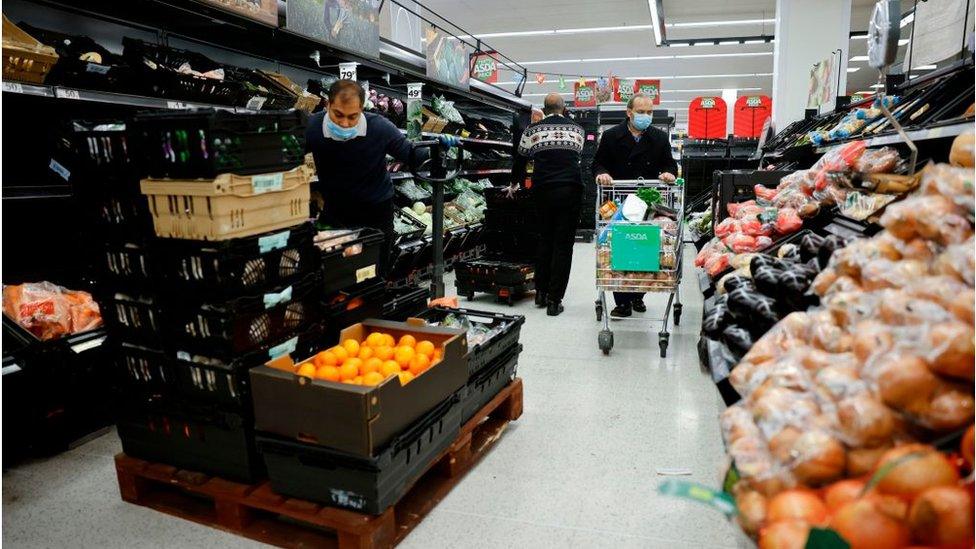Meat factories warn Covid absences could hit supplies
- Published
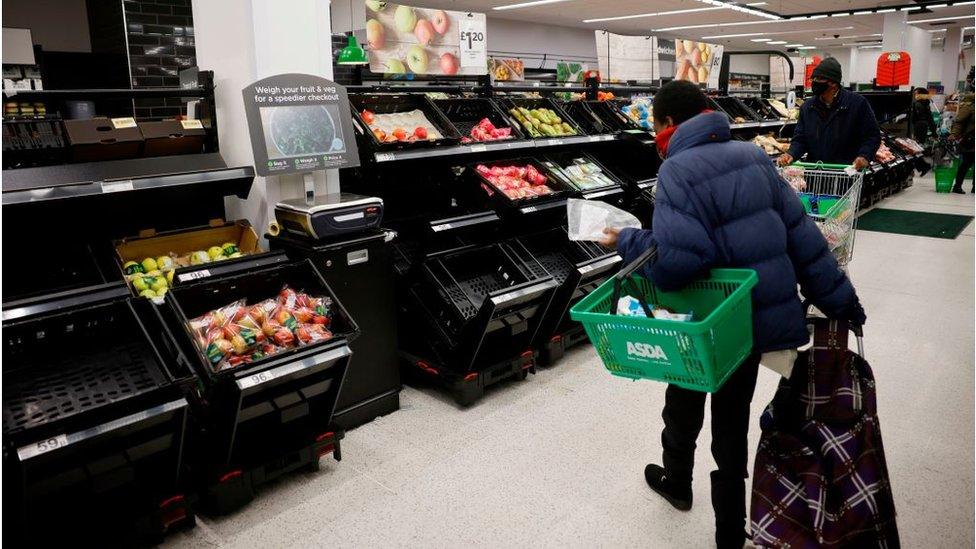
Some supermarkets faced issues over the festive period due to ports disruption
The UK meat industry has called for the early vaccination of workers to keep food supplies running smoothly during the coronavirus crisis.
It warned that absences during the pandemic, coupled with disruption at ports, could hit food supply chains.
An early vaccination call for supermarket staff was also made by the boss of Sainsbury's on Thursday.
The government said the food industry remains "well-prepared" to make sure people have the food they need.
The British Meat Processors Association (BMPA) said coronavirus and disruption at ports due to new systems brought in after the Brexit transition period were "a severe challenge to the industry and to the smooth running of the nation's food supply chain".
It argued frontline workers in meat factories should get early vaccinations due to the risk of a rapid spread of the new strains of the virus among key workers.
The government has set out who will get vaccinated first, which starts with care home residents and the oldest and most vulnerable people.
But Nick Allen, chief executive of the BMPA, said it would be logical to also prioritise key workers in the food industry.
"As the new coronavirus variant takes hold across the whole of the UK, we are hearing widespread reports of rapidly rising absences in the food supply chain," he said.
Some firms supplying supermarkets "are seeing a tripling of staff having to take time off work through illness or enforced self-isolation", he added.
Pressures on staff during the lockdown include illness, having to self-isolate, and childcare while some schools are closed under England's lockdown.
Due to the specialised nature of meat production, if even a few key factory personnel such as the foreman or managers are absent, production can stop, Mr Allen said.
Vaccine rollout
Early vaccinations should not be restricted to the meat industry, according to Mr Allen. All key workers in the food industry should get early vaccinations, he said.
Even supermarkets themselves are having problems with absences, he suggested.
"The key food supply chains ought to be prioritised," he said. "All food industry key workers should be prioritised [for vaccination]".
The government is advised on vaccinations by a group of experts called the Joint Committee on Vaccination and Immunisation (JCVI).
Professor Wei Shen Lim, Covid-19 Chair for the JCVI, said the committee's advice on vaccine prioritisation "was developed with the aim of preventing as many deaths as possible."
"As the single greatest risk of death from Covid-19 is older age, prioritisation is primarily based on age," he said.
"It is estimated that vaccinating everyone in the priority groups would prevent 99% of deaths, including those associated with occupational exposure to infection," the professor added.
Supermarket sweep
Sainsbury's boss Simon Roberts also called for early vaccinations for key workers on Thursday.
"My view is that priority has to be given to those that need it first," he said. "Those on the frontline should be part of that as and when capacity becomes available."
Absence rates for Sainsbury's staff are lower than at the peak of the crisis, but are rising, and have stepped up in the last few days, he said.
The Sainsbury's absence rate is currently 8%. The business has 172,000 employees.
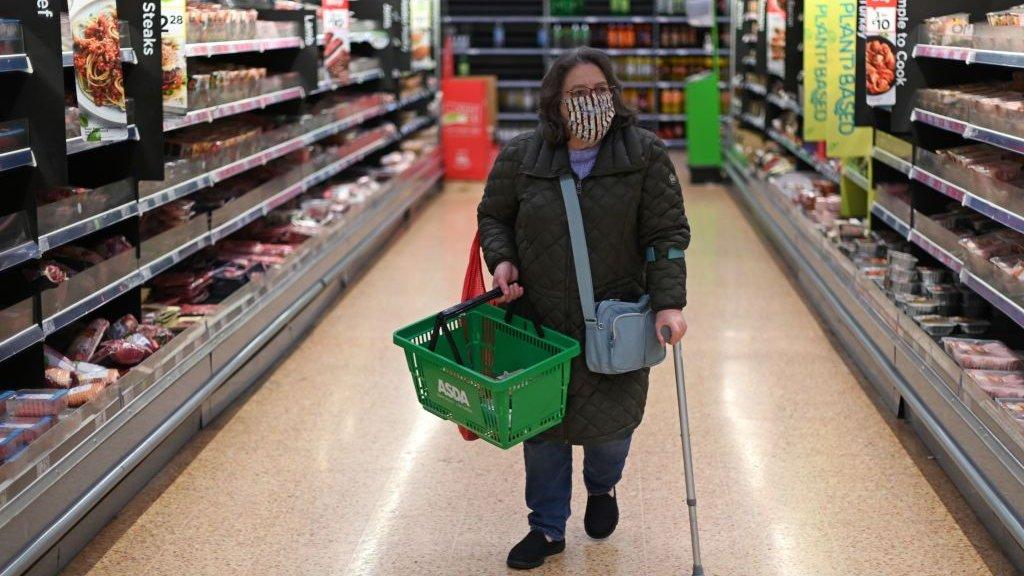
Asda said that it had seen an increase in employees self-isolating and shielding in line with the rising UK infection rate.
However, it said that absence rates were still lower than at the peak of the pandemic.
"We are taking proactive steps to manage colleague absences by retaining temporary colleagues hired over the Christmas period and are bringing in additional temporary colleagues in those stores that need them the most," and Asda spokesman said.
Tesco has asked clinically vulnerable staff to stay at home.
Morrisons, meanwhile, is also seeing more absences, but the rate is still more than half that of the peak of the pandemic. It is also a bigger business having taken on 26,000 extra staff during the crisis.
Andrew Opie, director of food and sustainability at the British Retail Consortium said: "While absence rates are currently rising, retailers are closely monitoring the situation in stores and distribution centres and supply chains continue to run smoothly.
A spokesperson for the Department for Environment, Food, and Rural Affairs said: "As we have seen in recent months, the UK has a large, diverse and highly resilient food supply chain.
"We continue to closely monitor the situation and are working closely with the food industry on the workforce and absence related challenges presented by the pandemic."
They added that the food industry remains "well-prepared" to make sure people across the country have the food they need.
Problems at ports
UK ports have seen disruption due to the effects of coronavirus on trade and new systems brought in after the Brexit transition period.
Mr Roberts of Sainsbury's said that, so far, the flow of goods from Europe is in decent shape, but there had been some problems in sending food to Northern Ireland.There is still some backlog in general merchandising, he added.
However, Scottish seafood exporters warned on Thursday that they had been hit by the "perfect storm of Brexit disruption".
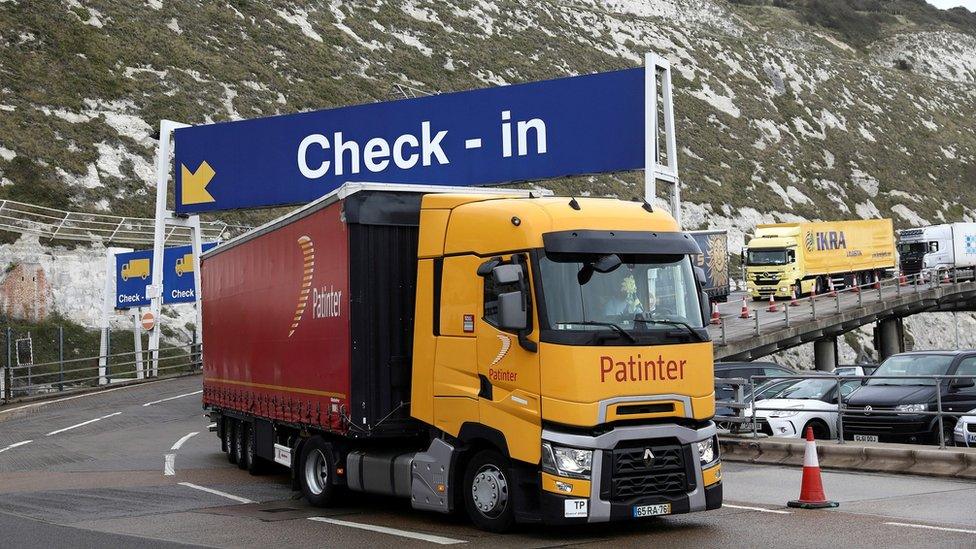
"Weakened by Covid-19, and the closure of the French border before Christmas, the end of the Brexit transition period has unleashed layer upon layer of administrative problems, resulting in queues, border refusals and utter confusion," said Donna Fordyce, chief executive of Seafood Scotland.
She said IT problems in France meant consignments were diverted from Boulogne-sur-Mer to Dunkirk, "which was unprepared as it wasn't supposed to be at the export frontline."
There have also been IT issues on the UK side with HMRC, she added.
"These businesses are not transporting toilet rolls or widgets," she said. "They are exporting the highest quality, perishable seafood which has a finite window to get to markets in peak condition. If the window closes these consignments go to landfill."
The National Federation of Fishermen's Organisations also warned of delays to fish exports, external due to "a brick wall of bureaucracy".
Related topics
- Published7 January 2021
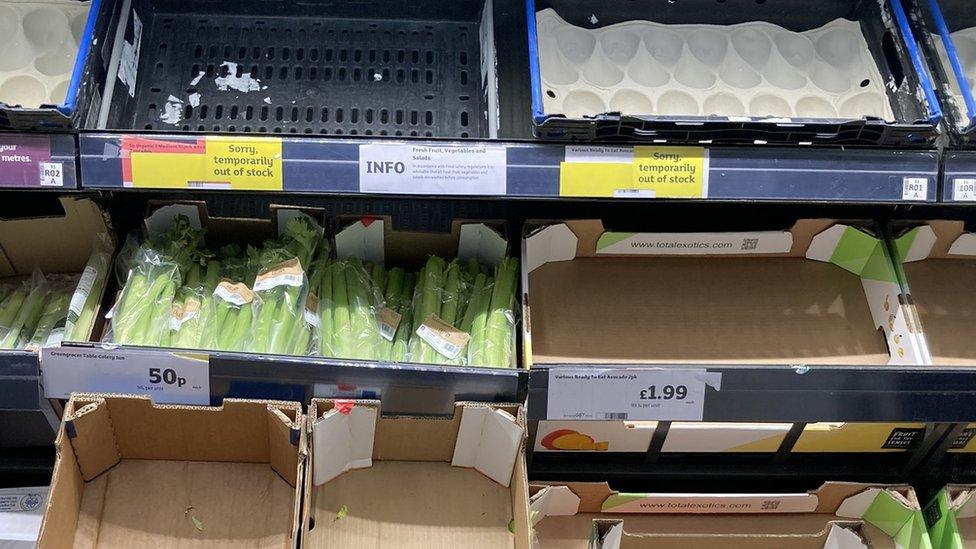
- Published6 January 2021
